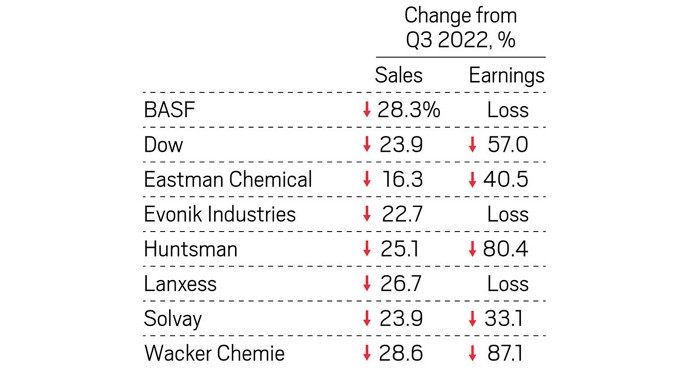
Many of Europe’s biggest chemical producers—including the German firms BASF, Covestro, Evonik Industries, and Lanxess—have reported declining sales and net losses for the third quarter. Europe’s chemical sector is now firmly in cost-cutting mode, and some companies are closing manufacturing plants because of ongoing soft demand for their products.
Third-quarter results
Sales and earnings declined for many leading chemical companies.
Source: C&EN tabulations based on company documents.
BASF, still the world’s largest chemical company, recorded a loss of $264 million for the third quarter, compared with earnings of $962 million in the year-earlier period, and sales of $16.2 billion, down 28%. The German major cites considerably lower prices for products sold by its materials, chemicals, and surface technologies businesses and lower sales volumes across the board.
BASF announced measures to cut costs by about $215 million annually, adding to plans to cut costs by more than $750 million per year by 2027. The firm plans to reduce its capital investments over the next 5 years by about $4.3 billion, to $26.5 billion. “We have more projects than money,” CEO Martin Brudermüller said in a press briefing.
Lanxess also lost money in the third quarter. “We see no signs of recovery for the rest of the year,” CEO Matthias Zachert says in a press release. The firm plans a one-time savings of $107 million in 2023 and annual savings of $160 million starting in 2025. The cuts will eliminate 870 jobs, including 460 in Germany. The company says it has initiated the sale of its urethane chemical division and will use the cash to help pay down debt.
“Germany’s chemical industry continues to face an extremely challenging business environment,” Anna Wolf, industry expert at IFO Institute, a German economic research group, says in a press release. In October, 48% of German chemical companies reported to IFO that their order situation “remains tense,” the institute states. One problem is that electricity prices in Germany continue to be higher than in many other countries, it says.
Chemical companies elsewhere in Europe are also struggling. The Belgian firm Solvay posted a 24% drop in third-quarter sales to $2.9 billion. Its earnings fell 33%, to $360 million. Solvay’s aroma chemical business, which sells to the food and fragrance markets, fared worst of all, reporting a 41% decline in sales.
Weak demand for chemicals is causing companies across Europe to close plants. Trinseo says it will shut its ethylbenzene and styrene plant in Terneuzen, the Netherlands. Celanese plans to close its nylon 6,6 plant in Uentrop, Germany. And published reports say that Kem One has mothballed its chlor-alkali plants in Lavéra and Fos, France, and that Sabic will close a polycarbonate line in Cartagena, Spain.
The US chemical sector has financially outperformed its European counterpart for the past 2 years, according to data from the investment firm Jefferies. Nevertheless, US chemical companies have also been hit by soft demand for their products. Dow, Eastman Chemical, and Huntsman all reported a drop in third-quarter sales and earnings.
Chemical & Engineering News
ISSN 0009-2347
Copyright © 2023 American Chemical Society






